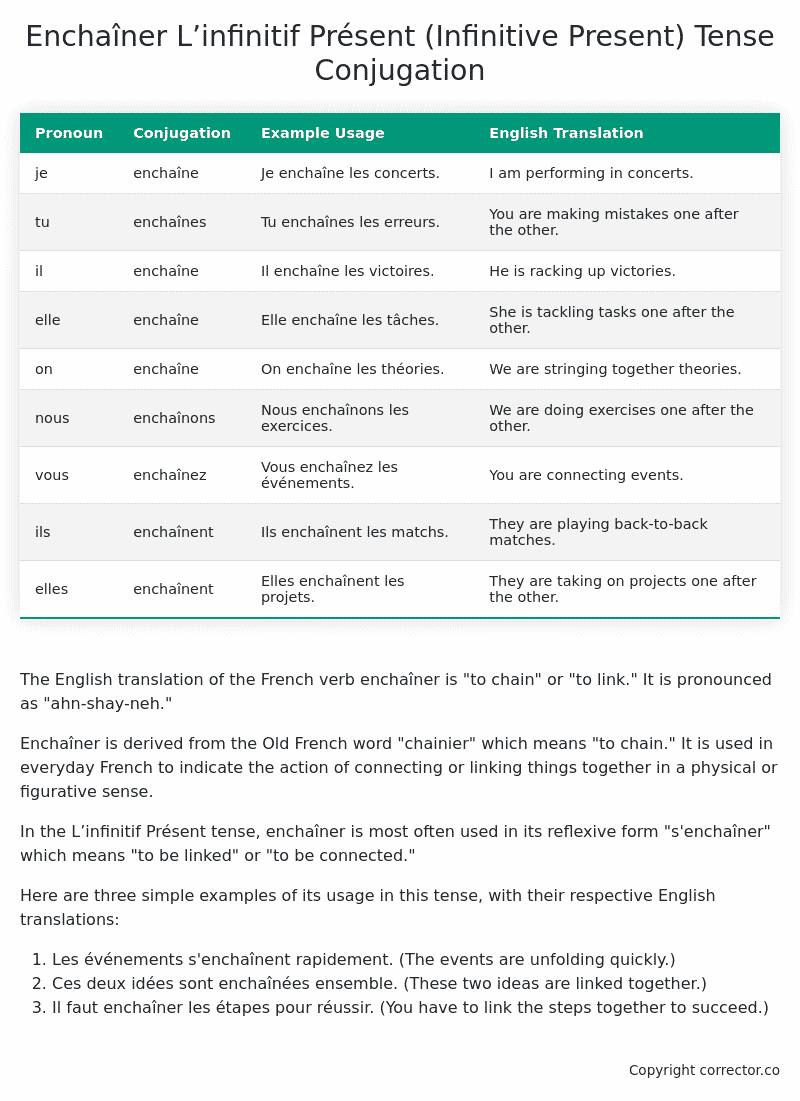L’infinitif Présent (Infinitive Present) Tense Conjugation of the French Verb enchaîner
Introduction to the verb enchaîner
The English translation of the French verb enchaîner is “to chain” or “to link.” It is pronounced as “ahn-shay-neh.”
Enchaîner is derived from the Old French word “chainier” which means “to chain.” It is used in everyday French to indicate the action of connecting or linking things together in a physical or figurative sense.
In the L’infinitif Présent tense, enchaîner is most often used in its reflexive form “s’enchaîner” which means “to be linked” or “to be connected.”
Here are three simple examples of its usage in this tense, with their respective English translations:
- Les événements s’enchaînent rapidement. (The events are unfolding quickly.)
- Ces deux idées sont enchaînées ensemble. (These two ideas are linked together.)
- Il faut enchaîner les étapes pour réussir. (You have to link the steps together to succeed.)
Table of the L’infinitif Présent (Infinitive Present) Tense Conjugation of enchaîner
| Pronoun | Conjugation | Example Usage | English Translation |
|---|---|---|---|
| je | enchaîne | Je enchaîne les concerts. | I am performing in concerts. |
| tu | enchaînes | Tu enchaînes les erreurs. | You are making mistakes one after the other. |
| il | enchaîne | Il enchaîne les victoires. | He is racking up victories. |
| elle | enchaîne | Elle enchaîne les tâches. | She is tackling tasks one after the other. |
| on | enchaîne | On enchaîne les théories. | We are stringing together theories. |
| nous | enchaînons | Nous enchaînons les exercices. | We are doing exercises one after the other. |
| vous | enchaînez | Vous enchaînez les événements. | You are connecting events. |
| ils | enchaînent | Ils enchaînent les matchs. | They are playing back-to-back matches. |
| elles | enchaînent | Elles enchaînent les projets. | They are taking on projects one after the other. |
Other Conjugations for Enchaîner.
Le Present (Present Tense) Conjugation of the French Verb enchaîner
Imparfait (Imperfect) Tense Conjugation of the French Verb enchaîner
Passé Simple (Simple Past) Tense Conjugation of the French Verb enchaîner
Passé Composé (Present Perfect) Tense Conjugation of the French Verb enchaîner
Futur Simple (Simple Future) Tense Conjugation of the French Verb enchaîner
Futur Proche (Near Future) Tense Conjugation of the French Verb enchaîner
Plus-que-parfait (Pluperfect) Tense Conjugation of the French Verb enchaîner
Passé Antérieur (Past Anterior) Tense Conjugation of the French Verb enchaîner
Futur Antérieur (Future Anterior) Tense Conjugation of the French Verb enchaîner
Subjonctif Présent (Subjunctive Present) Tense Conjugation of the French Verb enchaîner
Subjonctif Passé (Subjunctive Past) Tense Conjugation of the French Verb enchaîner
Subjonctif Imparfait (Subjunctive Imperfect) Tense Conjugation of the French Verb enchaîner
Subjonctif Plus-que-parfait (Subjunctive Pluperfect) Tense Conjugation of the French Verb enchaîner
Conditionnel Présent (Conditional Present) Tense Conjugation of the French Verb enchaîner
Conditionnel Passé (Conditional Past) Tense Conjugation of the French Verb enchaîner
L’impératif Présent (Imperative Present) Tense Conjugation of the French Verb enchaîner
L’infinitif Présent (Infinitive Present) Tense Conjugation of the French Verb enchaîner (this article)
Struggling with French verbs or the language in general? Why not use our free French Grammar Checker – no registration required!
Get a FREE Download Study Sheet of this Conjugation 🔥
Simply right click the image below, click “save image” and get your free reference for the enchaîner L’infinitif Présent tense conjugation!

Enchaîner – About the French L’infinitif Présent (Infinitive Present) Tense
Forming the Infinitive Present
Common Everyday Usage Patterns
As a Verb’s Dictionary Form
After Modal Verbs
As an Imperative
In Infinitive Clauses
Interactions with Other Tenses
Present Tense
Future Tense
Conditional Tense
Passé Composé
Imperfect Tense
Subjunctive and Conditional Moods
Summary
Want More?
I hope you enjoyed this article on the verb enchaîner. Still in a learning mood? Check out another TOTALLY random French verb conjugation!


